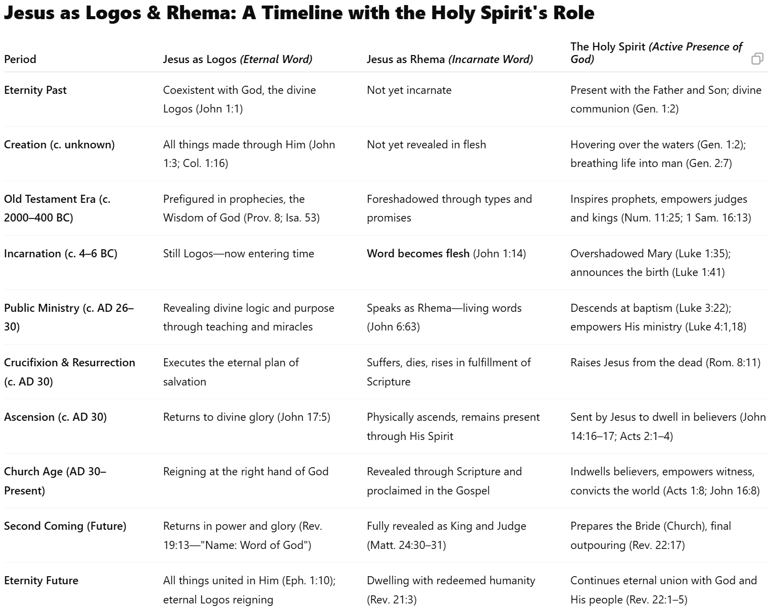Why Consider Jesus Seriously?
If you’re exploring the deeper questions of life—about truth, meaning, God, and the state of the world—you owe it to yourself to examine the claims of Jesus Christ.
Consider Jesus seriously because your soul, your purpose, and your eternity are worth it. If He is who He says He is, then nothing matters more than knowing Him.



Jesus as Logos and Rhema
A timeline with the Holy Spirit's Role
1. His Claims Are Unavoidable
Jesus didn’t claim to be just a good teacher or moral example — He claimed to be God in human form (John 10:30, John 14:6). If that’s true, then ignoring Him isn’t just a personal choice — it’s missing out on the most significant truth in human history.
“I am the way, the truth, and the life. No one comes to the Father except through Me.” – John 14:6
2. His Life Was Radically Different
Jesus didn’t just teach love — He lived it perfectly. He healed the broken, forgave sinners, and loved His enemies. Even those who reject His divinity often admit His life is unmatched in beauty, humility, and sacrifice.
3. His Death and Resurrection Demand a Response
The crucifixion wasn’t a tragic end — it was a planned rescue. Jesus died to take on the weight of humanity’s sin and rose again, defeating death itself. The resurrection, supported by historical testimony and the transformation of His disciples, changes everything.
“If Christ has not been raised, your faith is futile; you are still in your sins.” – 1 Corinthians 15:17
4. His Teachings Address the Deepest Human Needs
Jesus speaks to identity, purpose, love, truth, justice, and eternity. He doesn’t offer surface fixes but goes to the heart of human brokenness with grace and truth.
5. Ignoring Him Doesn’t Erase the Question
Whether one believes or not, the person of Jesus continues to challenge, comfort, and confront. Ignoring Him doesn’t make His claims go away. Sooner or later, we each must decide what we believe about Him — and that decision has eternal weight.
Even Prophecy Warned Us About This Time
What we're witnessing today — spiritual confusion, deception in leadership, and the rise of manipulative voices — is not a random cultural moment. It was foretold long ago in Scripture, and it aligns with the deeper shifts many feel internally but struggle to articulate.
"Then I saw another beast rising out of the earth. It had two horns like a lamb and it spoke like a dragon."
— Revelation 13:11 (ESV)
This figure looked harmless — even Christ-like — but spoke with a voice of distortion. It’s a portrait of false spiritual authority that mimics the appearance of good while spreading confusion and control.
Discernment Isn’t Optional — It’s a Logical and Spiritual Imperative
In a world saturated with information, ideas, and ideologies, discernment is not only a spiritual command — it’s a logical necessity. Even those outside the Christian faith recognize the psychological dangers of manipulation, groupthink, and ideological echo chambers.
"Beloved, do not believe every spirit, but test the spirits to see whether they are from God, for many false prophets have gone out into the world."
— 1 John 4:1 (ESV)
This verse doesn’t call for blind belief — it calls for thoughtful engagement, critical thinking, and spiritual awareness. It is a framework for investigation, not indoctrination.
The Scientific and Rational Basis for Believing in Christ as the Rhema (Living Word)
Many assume that science and faith are in conflict — but this is a misunderstanding. In reality, modern discoveries in quantum physics, neurology, and cosmology suggest that reality is far more complex, interconnected, and intelligent than once believed.
Quantum theory, for example, shows that conscious observation affects the state of matter — a phenomenon that parallels the biblical concept of Rhema: the spoken, living Word that brings invisible potential into manifested form.
"In the beginning was the Word, and the Word was with God, and the Word was God."
— John 1:1 (ESV)
The “Word” here — Logos — refers to the divine reason, but Jesus also functions as Rhema: the personal, spoken Word of God that actively transforms the human soul.
Science confirms that words have neurological effects. Neuroplasticity demonstrates that the brain physically restructures itself in response to spoken truth or trauma. Words shape belief. Belief shapes perception. Perception defines behavior. This is not wishful mysticism — this is observable, measurable human transformation.
Christ as Rhema is not an abstract concept; He is the active force of truth that resonates with those willing to listen, intellectually and spiritually.
Historically Verified: Jesus Was Not Invented by Religion
Contrary to some modern skepticism, Jesus of Nazareth is one of the most historically verified individuals in ancient history. Historians such as Josephus (Jewish) and Tacitus (Roman), who were not Christians, acknowledged His life and the early Christian movement.
Even the most critical secular scholars agree that:
Jesus existed
He was crucified
His followers believed He rose from the dead
The movement He sparked transformed civilizations
Faith in Christ is not a rejection of reason — it is a reasonable invitation to trust what has been both documented and personally confirmed by millions across time.
A Battle for the Mind and Soul
The Book of Revelation unveils that the final conflict is not merely physical — it is ideological and spiritual. Truth will not be defeated by force, but by deception. That’s why spiritual charlatans will appear persuasive, charismatic, and even loving — yet their fruit will be fear, control, and division.
"...they are demonic spirits performing signs, who go out to the kings of the whole world..."
— Revelation 16:14 (NIV)
Deception is powerful because it feels good before it’s exposed. And the most dangerous lies are the ones that sound closest to truth.
Even Jesus warned:
"Watch out that no one deceives you. For many will come in my name, claiming, 'I am the Messiah,' and will deceive many."
— Matthew 24:4–5 (NIV)
You’re Invited — Not to Religion, But to Truth
If you’re skeptical of religion — you’re in good company. Even Jesus challenged the religious elite who used spiritual systems to control people.
He invites you not into blind allegiance, but into a relationship with truth itself — truth that can be tested, verified, and trusted.
"I stand at the door and knock. If anyone hears my voice and opens the door, I will come in..."
— Revelation 3:20 (ESV)
As the Rhema, Christ still speaks — not through control or fear, but with love, clarity, and reason.
You don’t have to abandon logic to embrace faith. In fact, real faith demands more logic, more courage, and more honesty than any ideology ever could.
"If I find in myself a desire which no experience in this world can satisfy, the most probable explanation is that I was made for another world."
— C.S. Lewis
Ask. Test. Think. Seek.
You were designed to discern. You were created to think, feel, reflect, and perceive.
And Jesus — as the Living Word — welcomes that. You don’t need to perform. You don’t need to pretend. You just need to respond.
Consider These Questions:
What voices are shaping your truth — and do they lead to clarity or confusion?
When you strip away religion and culture, what remains that feels undeniably real?
If truth is a Person, what would it mean to meet Him?
Truth doesn’t need coercion. It invites courage. And Jesus — the Rhema Word — is still speaking to those who are listening.


A Closing Word for the Skeptical and the Seeking
We’re living in a time where both truth and deception are louder than ever. But noise isn't clarity.
Here’s a deeper truth: Not every spiritual experience is real — but not every doubt is wrong.
Jesus Christ remains a singular figure in all of history — not as a religious mascot, but as the convergence of wisdom, power, and love. His life and words offer a timeless model for discernment, freedom, and healing.
If you’re seeking truth, you’re already on the right path.
Let faith and reason walk beside you.
You are invited to test — and to find.
“You will seek me and find me, when you seek me with all your heart.”
— Jeremiah 29:13 (ESV)
So question boldly. Seek slowly. Discern wisely.
Because whether or not you believe in God yet — you were made for truth.
We are in a time where both truth and deception increase in visibility.
Jesus Christ remains the only center where wisdom, power, and love converge in perfect balance.
If you’re seeking truth — you’re already on the right path.
Not everything labeled “spiritual” is good. But not every question is doubt.
Keep seeking with an open heart and a discerning mind.
Let faith and reason walk beside you.
You are invited to test — and to find.
